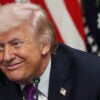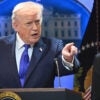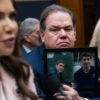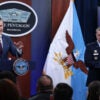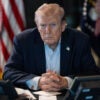Today, the Senate Foreign Relations Committee held a hearing on the (deeply flawed) Iran deal with Secretary of State John Kerry, Secretary of Energy Ernest Moniz, and Secretary of Treasury Jacob Lew.
In preparation for the hearing, The Heritage Foundation published 15 questions the administration needs to clarify.
A majority of senators’ questions touched upon four important areas:
1. Iran’s Support for Terrorism
Iran is one of the most significant supporters of terrorism in the Middle East and around the world. In 2011, Iran plotted to kill the Saudi ambassador in the United States, a clear act of war had the plot been successful.
As Sen. Bob Corker, R-Tenn., pointed out, Iran has been responsible for maiming and killing American service members in Iraq.
Sanction relief is bound to provide Iran with billions of dollars that will enable Iran to continue to support terrorism, with potentially deadly consequences for Americans.
2. Front-Loaded Sanctions Relief
Administration officials had a difficult time explaining the mechanics behind the lifting of sanctions and quantifying the differences among international, U.S. and European Union sanctions.
Jacob Lew, U.S. Secretary of Treasury, stated that the U.S. has powerful tools at its disposal with or without international sanctions.
This is good news and shows that there are alternatives to the flawed Iran deal.
Many senators on the committee were upset with the Iran deal for immediately lifting sanctions on ballistic missile testing and eventually lifting embargoes on ballistic missiles, conventional weapons, and nonproliferation.
Questions were not raised regarding provisions of the deal that potentially allow Iran to export sensitive nuclear technologies and even purchase or develop parts of nuclear weapons.
The sanctions regime will unravel as soon as the deal comes into effect, to the detriment of U.S. and allied interests.
While the administration claims that future presidents will have the same options Obama has today, this is simply not true.
In the future, Iran will have a better negotiating position than it has today and will be stronger, both conventionally and financially.
Additionally, a re-imposition of sanctions does not negate previously agreed upon agreements. Iran could be making hundreds of million dollars in business profit even as sanctions are re-imposed.
3. Potentially Inadequate Verification Provisions
Senators on the committee were particularly interested in the agreement’s verification provisions.
A major point of contention between the administration and the Senate is the administration’s failure to turn in all agreements related to the Joint Comprehensive Plan of Action, including those agreed between Iran and the International Atomic Energy Agency (IAEA).
The administration agreed to provide this documentation pursuant to the Corker-Cardin bill. Several senators called upon the administration to provide those agreements, but the witnesses were non-committal.
In fact, Secretaries Moniz and Kerry admitted they had not read these agreements.
Does Congress have to pass the deal to find out what is in it again? Members of the Foreign Relations Committee were also unhappy the administration did not provide Congress an opportunity to review the deal before the United Nations Security Council voted on it.
4. Previous Military Dimensions of Iran’s Nuclear Program
In the past, the International Atomic Energy Agency has found evidence of military activities on Iran’s nuclear sites.
In fact, Iran is known to have developed some of these sites covertly and lied about them to the International Atomic Energy Agency and other states.
The Iranian deception was so serious that the United Nations Security Council decided to impose several rounds of sanctions on Iran’s nuclear program.
The European Union, the U.S., and other nations separately imposed additional sanctions. Despite what some have said to the contrary, the United Nations sanctions will be lifted regardless of whether the International Atomic Energy Agency manages to get Iran to clarify Iran’s previous military nuclear activities.
This is a serious omission on the part the United States, Russia, China and the European Union.
American inspectors are not allowed to participate in inspections of Iran’s nuclear program.
This represents another serious flaw to the Iran deal—especially since the U.S. has some of the most highly trained and experienced nuclear inspectors in the world.
5. Concerns Over U.S. Allies
Sen. Corker asserted that the United States gave Iran an agreement that permits a perfectly legitimate path to a nuclear weapon.
Many senators were concerned over stability of U.S. alliances in the Middle East, particularly in Israel, whose Prime Minister Benjamin Netanyahu has been one of the most outspoken critics of the deal.
Needless to say, the Israeli criticism has to do with the substance of the deal, not with opposing to a diplomatic solution to an Iranian nuclear program.
The Iran deal remains a bad deal for the United States and its partners and allies.
Congress must provide its due diligence and vote in U.S. interest, not in the interest of terrorist mullahs in Tehran.

